If you want to grow your website, you need the right tools. Semrush is one of the most popular tools for online marketing. It helps you find better keywords, improve your website, and even spy on your competitors. But is it the right choice for you?
In this article, we will review Semrush. We will look at its features, pros, and cons. We will also answer common questions about it. Let’s dive in!
What is Semrush?
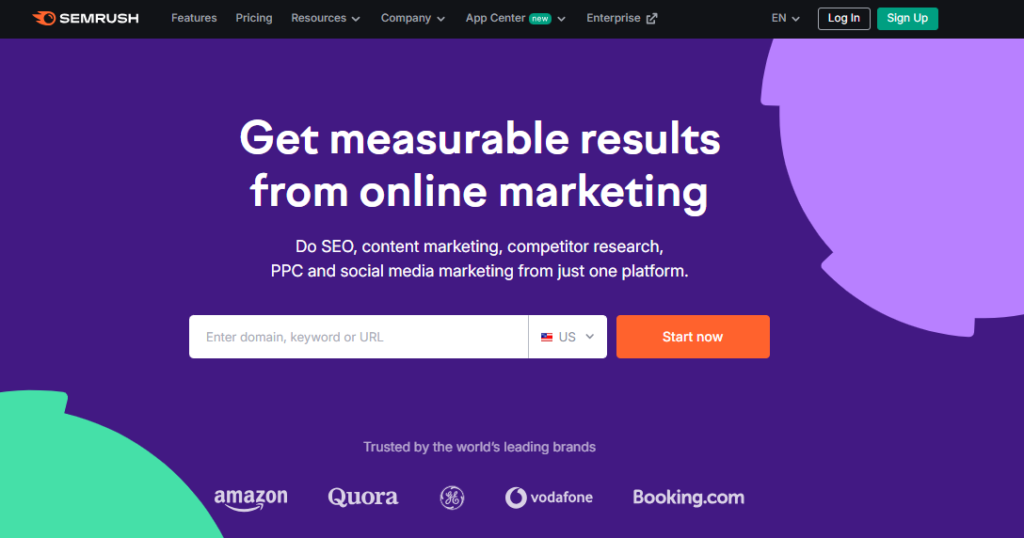
Semrush is an all-in-one digital marketing platform. It offers over 50 tools. These tools help with:
- SEO (Search Engine Optimization)
- Content Marketing
- Keyword Research
- PPC (Pay-Per-Click)
- Social Media Marketing
With Semrush, you can:
- Find the best keywords for your website
- See how your competitors are performing
- Check the health of your website
- Build better backlinks
- Track your search engine rankings
Semrush is trusted by over 10 million marketers worldwide. It started in 2008 and has grown to be a favorite in the marketing industry.
Top Features of Semrush
Semrush has many features. Let’s discuss the most important ones:
1. Domain Overview
The Domain Overview tool lets you see how any website is performing. It provides details like:
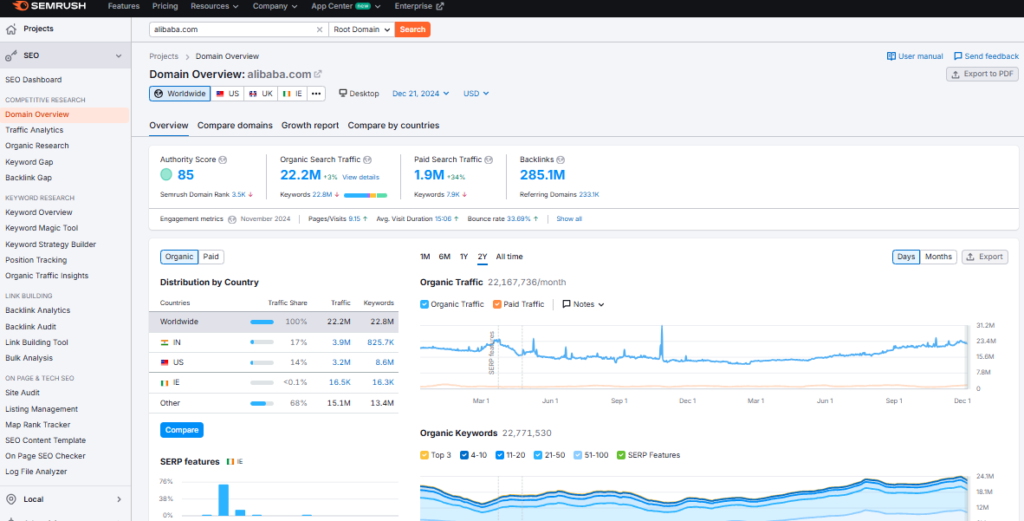
- Authority Score:
- A metric that measures the overall quality and SEO strength of the domain.
- Useful for evaluating your site or comparing competitors.
- Traffic Insights:
- Total monthly search traffic: Estimates the volume of visitors coming through organic searches.
- Country-based breakdown: View traffic distribution across different regions.
- Backlink Data:
- Total backlinks: Shows the number of links pointing to the site.
- Referring domains: Highlights how many unique websites link to the domain.
- Link attributes: Breakdown of follow vs. nofollow backlinks.
- Top Organic Keywords:
- Displays the most significant keywords bringing traffic to the site.
- Includes positions, search volumes, and other key metrics.
- Competitor Analysis:
- Lists main organic competitors based on similar keyword profiles.
- Includes metrics like competition level, shared keywords, and traffic comparison.
- SERP Features:
- Identifies search results features (like featured snippets, videos, etc.) associated with the domain.
- Competitive Positioning Map:
- A visual chart that plots your domain against competitors based on traffic and keywords.
- Keyword Intent Analysis:
- Breaks down the intent of keywords driving traffic (informational, transactional, navigational, etc.).
- Useful for aligning content strategies with audience needs.
Use Cases:
- Competitor Research: Discover what makes rival sites successful and identify gaps in your strategy.
- Performance Monitoring: Keep track of your website’s growth and identify areas needing improvement.
- SEO Benchmarking: Use the authority score and organic data to evaluate how well your site competes.
2. Keyword Research
Keyword research is a big part of SEO. Semrush helps you find keywords that your audience is searching for. With its Keyword Overview tool, you can see:
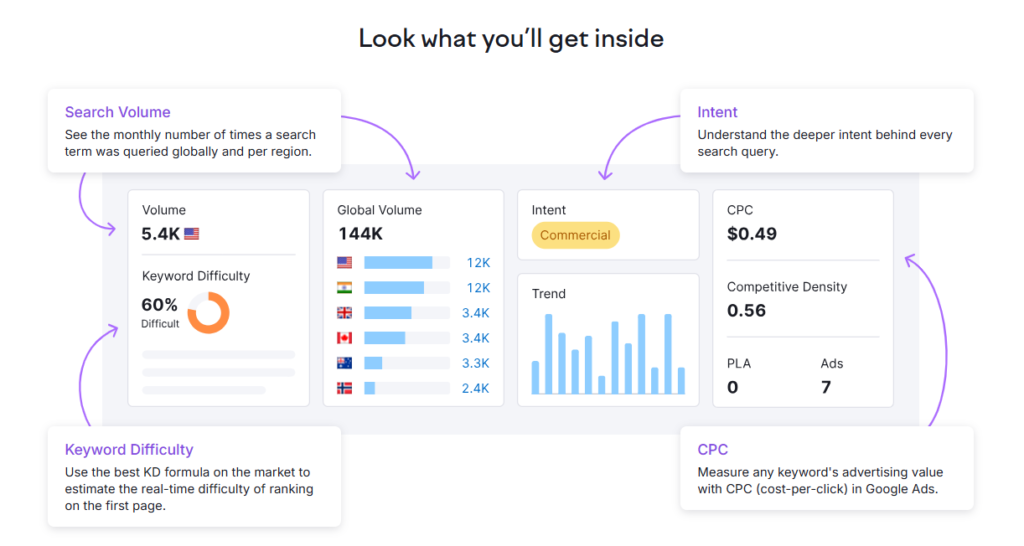
- Keyword Overview:
- Provides essential metrics like search volume, keyword difficulty, and CPC (cost per click).
- Displays keyword intent, indicating if the keyword is informational, transactional, or navigational.
- Shows keyword trends over time, helping you identify seasonal opportunities.
- Keyword Magic Tool:
- Generates thousands of keyword suggestions based on a seed keyword.
- Allows filtering by match types (broad, phrase, exact) and user intent.
- Offers a Questions Filter to identify query-based keywords for content optimization.
- Keyword Gap Tool:
- Compares your keyword strategy with competitors.
- Highlights keywords your competitors rank for, but you don’t.
- Identifies common keywords to refine your SEO efforts.
- Position Tracking:
- Monitors the ranking of specific keywords over time.
- Tracks keyword performance by location and device (desktop or mobile).
- Provides notifications for significant position changes.
- SERP Features Insights:
- Displays search engine results page (SERP) features like featured snippets, images, or local packs.
- Helps optimize content to capture these valuable SERP positions.
- Global and Local Data:
- Offers keyword data for multiple countries and languages.
- Enables businesses to target specific geographic markets.
- Keyword Lists and Management:
- Save and organize keywords into lists for easy access.
- Analyze saved keywords in bulk for detailed insights.
Use Cases:
- Content Creation: Find trending and high-intent keywords to create relevant, optimized content.
- SEO Strategy: Discover low-competition keywords to target for quick wins.
- PPC Campaigns: Identify high-value keywords for ad campaigns with better ROI.
- Competitive Analysis: Gain insights into competitors’ keyword strategies to stay ahead.
The Keyword Research Tool in Semrush is designed to simplify the process of finding and leveraging the right keywords for better rankings and traffic. Let me know if you’d like to include this in the document or customize further!
3. Site Audit
The Site Audit tool scans your website for issues. It checks for
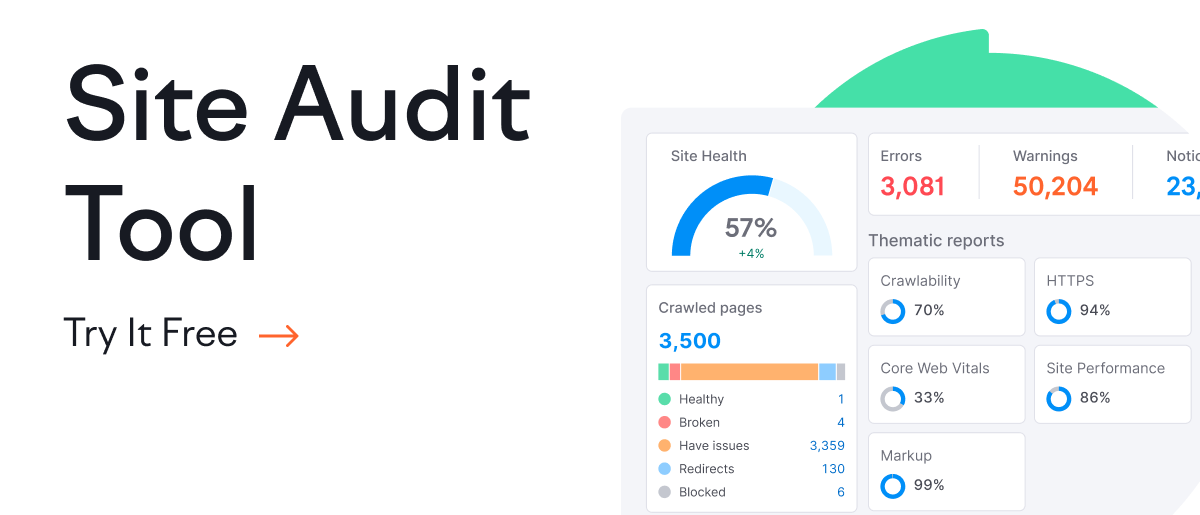
- Technical Issues:
- Identifies broken links (404 errors).
- Checks for missing SSL certificates.
- Scans for crawlability problems that block search engines from indexing your site.
- Speed and Performance:
- Measures page load time.
- Highlights pages with slow loading speeds.
- SEO Factors:
- Detects duplicate content across your website.
- Finds missing or poorly optimized meta descriptions and title tags.
- Checks keyword stuffing and improper header tag usage.
- Mobile-Friendliness:
- Assesses how well your site performs on mobile devices.
- Flags pages that aren’t responsive or optimized for mobile users.
- Security Issues:
- Alerts you about unsecure HTTP pages.
- Flags outdated software that may lead to vulnerabilities.
- Health Score:
- Assigns a health score to your website, showing overall SEO performance.
- Offers a clear report on which fixes to prioritize.
- Actionable Suggestions:
- Provides step-by-step guidance to fix problems.
- Helps with tasks like resolving duplicate content and enhancing on-page SEO.
This tool is particularly helpful if you want to improve your site’s health, speed, and rankings. Let me know if you’d like to include or customize this explanation further!
4. Backlink Analytics
Backlinks are important for SEO. The more quality backlinks your site has, the better it performs. Semrush’s Backlink Analytics tool shows:
- Total backlinks
- Referring domains
- Toxic links (bad links that harm your SEO)
You can also use the Link Building Tool to find new backlink opportunities.
5. Traffic Analytics
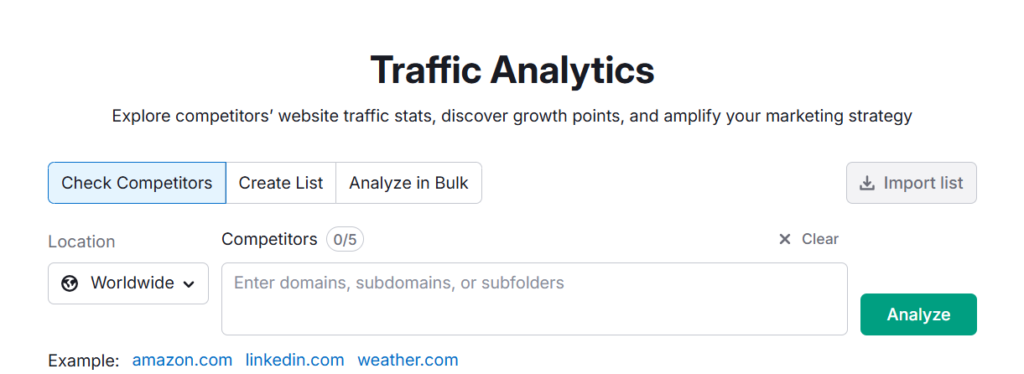
Want to know where your visitors come from? The Traffic Analytics tool helps you understand your audience. It shows:
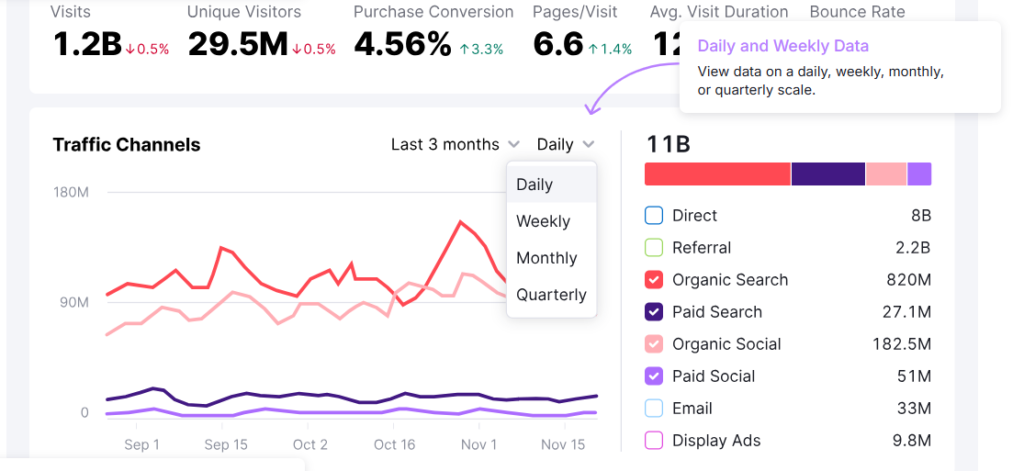
- Visitor Data:
- Total visits: The number of visitors to a site within a selected time period.
- Unique visitors: The count of individual users, avoiding duplicates.
- Engagement Metrics:
- Bounce rate: Percentage of visitors leaving after viewing only one page.
- Pages per session: Average number of pages a visitor views in one session.
- Average visit duration: How long visitors stay on the site.
- Traffic Sources:
- Breakdown of traffic sources: Search, social media, direct, referral, or paid.
- Insights into how visitors arrive at the site.
- Device Distribution:
- Separates traffic by desktop and mobile use.
- Helps businesses optimize for different devices.
- Geographical Data:
- Shows where visitors are located geographically.
- Useful for targeting specific regions.
- Historical Data:
- Access trends from previous months or years.
- Analyze growth or dips in traffic over time.
- Competitor Insights:
- Compare traffic performance with competitors.
- See top pages driving traffic to rival websites.
- Top Pages:
- List of the most-visited pages on a site.
- Helps identify high-performing content.
Use Cases:
- Planning marketing campaigns based on regional or device-specific data.
- Benchmarking against competitors to understand their traffic strategies.
- Analyzing visitor behavior for better site optimization.
The Traffic Analytics tool is ideal for businesses wanting to understand their audience better and refine their strategies. Let me know if you’d like to add this to your document!
Pros of Using Semrush
Semrush is a favorite for many reasons. Here are its biggest advantages:
1. All-in-One Solution
You don’t need multiple tools when you use Semrush. It has everything for SEO, content, and social media in one place.
2. Huge Database
Semrush has one of the largest keyword and backlink databases. It covers over 21 billion keywords and 43 trillion backlinks.
3. User-Friendly Reports
The reports are easy to understand. Even beginners can use them to improve their websites.
4. Generous Usage Limits
With Semrush, you can run more searches than many other tools. Even the basic plan allows 3,000 reports per day.
5. Helpful Support
The customer support team is responsive. They provide helpful resources like guides and webinars.
Cons of Using Semrush
No tool is perfect, and Semrush has its downsides. Here are a few cons:
1. High Price for Beginners
Semrush is expensive. The basic plan starts at $139.95 per month. This can be too much for small businesses or beginners.
2. Complex Interface
Semrush has many features. For new users, it can feel overwhelming. It takes time to learn how to use all the tools.
3. Traffic Data is an Estimate
The traffic numbers Semrush shows are not 100% accurate. They give a rough idea but might not match your actual analytics.
4. Focus on Google
Semrush mainly focuses on Google. If you need data for other platforms like Bing or YouTube, you may need other tools.
Who Should Use Semrush?
Semrush is not for everyone. Here are the people who can benefit the most:
1. SEO Experts
If you work in SEO, Semrush has all the tools you need. It helps with keyword research, site audits, and tracking rankings.
2. Content Creators
Content marketers can use Semrush to find trending topics and improve content performance.
3. Marketing Teams
Large teams will appreciate the all-in-one platform. It saves time and helps everyone stay on the same page.
4. Agencies
Marketing agencies can use Semrush to manage multiple clients. The reporting features make it easy to share results.
Advanced Features and Add-Ons
1. Content Marketing Toolkit
This feature helps you create better content. It offers tools to:
- Find trending topics
- Optimize content for SEO
- Analyze your content’s performance
You can also use the SEO Writing Assistant to ensure your articles are optimized for your target keywords.
2. Listing Management
For local businesses, this tool is a game-changer. It helps you:
- Manage your business listings on directories
- Improve your local SEO
- Monitor customer reviews
3. Advertising Toolkit
Semrush’s advertising tools let you:
- Research competitors’ ads
- Discover PPC keywords
- Analyze ad performance
This toolkit is perfect for businesses running paid campaigns.
4. Social Media Toolkit
With this tool, you can:
- Schedule posts on multiple platforms
- Track your social media performance
- Analyze competitors’ social strategies
5. Backlink Audit Tool
This feature helps you find toxic backlinks. Toxic links can hurt your site’s ranking. The tool also gives you tips to remove or disavow them.
Pricing Breakdown
Semrush offers several plans. Here’s a quick overview:
1. Pro Plan
- Price: $139.95/month
- Best for: Freelancers and small businesses
- Features: Basic tools with limited usage
2. Guru Plan
- Price: $249.95/month
- Best for: Growing businesses and agencies
- Features: Includes content marketing tools and historical data
3. Business Plan
- Price: $499.95/month
- Best for: Large enterprises
- Features: Advanced tools and higher usage limits
Semrush also offers add-ons like Listing Management and Traffic Analytics for an extra cost.
Conclusion
Semrush is a powerful tool for digital marketing. It has everything you need to grow your website. From SEO to content marketing, it covers all the bases. While it is expensive, the features and data make it worth the cost for serious marketers.
For beginners, it might feel overwhelming. But with time and practice, you can master it. If you want to take your marketing to the next level, Semrush is an excellent choice.
Frequently Asked Questions (FAQs)
1. Can I use Semrush for free?
Yes, Semrush offers a free plan. However, the features are limited. You can also try a 7-day free trial for premium plans.
2. Is Semrush worth the price?
If you are serious about digital marketing, Semrush is worth it. It offers many tools and large data sets that justify the cost.
3. Does Semrush work for small businesses?
Yes, but the cost might be high for small businesses. The Pro plan is the most affordable option for them.
4. What makes Semrush different from other tools?
Semrush combines many tools in one platform. It also has one of the largest keyword and backlink databases.
5. Is the traffic data accurate?
The traffic data is an estimate. It gives you a rough idea but may not match your actual analytics.
6. Can I cancel my subscription anytime?
Yes, you can cancel your subscription anytime. However, make sure to check the terms and conditions.
That’s it for our Semrush review! If you’re ready to try it, start with the free trial and explore its features. Good luck with your marketing journey!

I am a passionate digital marketer with a strong expertise in SEO and article writing. With years of experience in crafting compelling content and optimizing it for search engines, I help businesses enhance their online visibility and drive organic traffic. Whether it’s creating engaging blog posts or implementing effective SEO strategies, I am dedicated to delivering results that make an impact.
